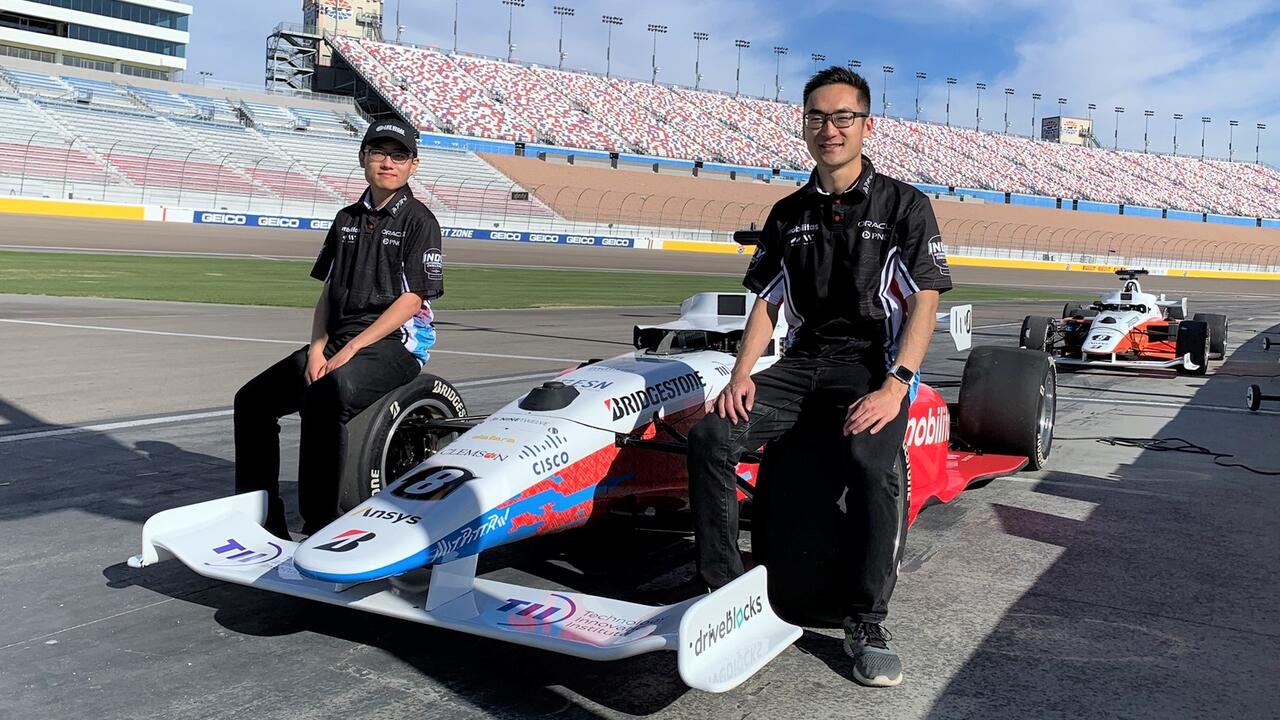
Overcoming adversity
Graduate students move on to Las Vegas for next test of their million-dollar autonomous racecar

Graduate students move on to Las Vegas for next test of their million-dollar autonomous racecar
By Brian Caldwell Faculty of EngineeringA pair of University of Waterloo graduate students have put a disappointing crash behind them as they prepare for the next historic step in autonomous racing this week.
Brian Mao and Ben Zhang are in Las Vegas as members of a multi-university team competing with a self-driving racecar against peers from around the world.
To be staged Friday at the Las Vegas Motor Speedway, the event builds on the first-ever Indy Autonomous Challenge in October at the Indianapolis Motor Speedway, where the winning car logged an average speed of almost 136 miles per hour (mph) to take the US $1-million top prize.
"It's been an amazing opportunity to advance autonomous vehicle technology once again,” said Mao, who has been in Las Vegas with Zhang for six weeks to prepare for the race.
Mao and Zhang were in the pits in Indianapolis with teammates from the Massachusetts Institute of Technology, the University of Pittsburgh and the Rochester Institute of Technology – the only student-led team in the final - when their million-dollar entry had a GPS malfunction, crashed into an infield wall and failed to finish.
The race in Las Vegas, held as part of the annual Consumer Electronics Show, will be an even tougher test of cutting-edge autonomous hardware and artificial intelligence (AI) algorithms.
Nine modified Dallara AV-21 racecars at Indy took the track alone to complete an obstacle avoidance challenge and do two laps as fast as possible. In Las Vegas, the competition will include head-to-head, high-speed passing.
Mao and Zhang are the team leads for controls and vehicle modeling. They have been focusing on software integration, which includes accounting for noisy sensors and vehicle dynamics.
Their car has reached speeds in testing of over 140 mph and they look forward to demonstrating its improved capabilities, including passing maneuvers.
At least five teams representing universities from countries including Germany, Italy, Poland, South Korea and Switzerland are scheduled to take part. The race will be livestreamed starting at 3 p.m.
Mao earned a degree in mechanical engineering (BASc ’20) at Waterloo and is now pursuing a master’s degree in applied mathematics. Zhang has a degree in computer science (BCS ’20) and is studying for his master’s in electrical and computer engineering.
The autonomous racing challenge was launched in 2019 to advance self-driving technology and speed up its commercialization. It began with teams from more than 40 universities and included a series of simulated races leading up to the Indy competition.
Waterloo initially had a small team of its own called WATORACE before teaming up with three U.S. schools to pool resources and expertise. Team members Kyle Anderson, a software engineering student, and Ryan Larkin, who is studying computer science, have continued to provide valuable assistance.
Photo: Ben Zhang (left) and Brian Mao have been working in Las Vegas for six weeks to get their autonomous car ready for Friday's race against teams from around the world.

Read more
Redefining capstone learning by bringing students, faculty and community partners together to tackle real-world challenges

Read more
Here are the people and events behind some of this year’s most compelling Waterloo stories

Read more
From co-op to community, grads offer insights and inspiration for the next generation of students
The University of Waterloo acknowledges that much of our work takes place on the traditional territory of the Neutral, Anishinaabeg, and Haudenosaunee peoples. Our main campus is situated on the Haldimand Tract, the land granted to the Six Nations that includes six miles on each side of the Grand River. Our active work toward reconciliation takes place across our campuses through research, learning, teaching, and community building, and is co-ordinated within the Office of Indigenous Relations.